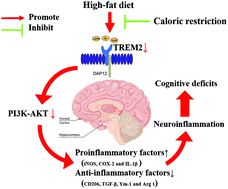Caloric restriction ameliorates high-fat diet induced cognitive deficits through attenuating neuroinflammation via the TREM2-PI3K/AKT signaling pathway
Abstract
Prolonged high-fat diet (HFD) feeding impairs cognitive function in rodents. However, the mechanism of caloric restriction (CR) for remedying HFD-induced cognitive dysfunction remains elusive. In the present study, we investigated the effect of CR on HFD-induced cognitive dysfunction and its possible mechanism. BALB/c mice were fed with HFD for 16 weeks and subsequently subjected to CR for 12 weeks. After cognitive function was evaluated by behavioral tests such as Morris water maze and three-chamber paradigm tests, the mice were sacrificed. The prefrontal cortex and hippocampus were rapidly harvested and deposited at −80 °C. The neuroprotective mechanisms of CR on HFD-induced cognitive deficits were evaluated by histopathological and electron microscopy observations, western blotting and immunofluorescence. Compared with the normal control group, HFD mice exhibited obvious cognitive deficits, glucose tolerance impairment, neuronal degeneration and abnormalities of synaptic ultrastructure in the cortex and hippocampus. CR treatment improved cognitive dysfunction and histopathological changes as well as increased the cognition-related protein levels of PSD-95, synaptophysin and BDNF. Meanwhile, HFD increased the protein levels of pro-inflammatory factors including iNOS, COX-2 and IL-1β but decreased the protein levels of anti-inflammatory factors such as CD206, TGF-β, Ym-1 and Arg 1 in the prefrontal cortex and hippocampus, downregulated the protein levels of TREM2 and PI3K and decreased the phosphorylation level of AKT, which can be reversed by CR treatment. Therefore, our results indicated that CR ameliorated cognitive deficits of mice induced by a high-fat diet. The underlying mechanism is associated with the attenuation of the neuroinflammatory response mediated by the TREM2-PI3K/AKT signaling pathway.



 Please wait while we load your content...
Please wait while we load your content...